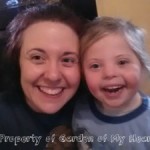A very dear friend of mine had an interesting interaction at work. She has a framed picture of our two kiddos on her desk and someone came around to ask her about it. That person said it was sad Rowenna has Down syndrome, and my friend told her that it isn’t sad, Rowenna is great. I’m pretty impressed with my friend because it took me a very long time to respond to people with anything resembling composure and tact, and here my friend knocked it out of the park on her first try.
In relating this story to me, she said she didn’t like that people see Rowenna’s diagnosis as something sad. She asked what she could do to help make the world a place where that isn’t the reaction people have when they hear someone has Down syndrome.
I thought that was a very interesting question, and thought I would share my suggestions here, since I know a lot of Rowenna’s family and friends read the blog and might have the same question. I wish I could say that comments like “that’s sad” or “I’m sorry” are rare, but there are simple things you can do and say.
What can you do, as a family member or friend of Rowenna, to make this world a little better and brighter and loving? In no particular order:
-Believe, firmly and without a shadow of a doubt, that people with disabilities have worth. They are capable and valuable and worthy.
-Recognize people with disabilities as peers. See them as human beings, not as problems to fix. See hearts, see souls.
-See potential in people with disabilities. See different ways of doing things.
-Learn a little about a diagnosis. When someone starts spouting off random “facts” you can share the truth.
-Use People First language and stop using the r-word. You may be surprised at how quickly people pick up on People First language without you ever pointing it out.
-If someone expresses sorrow or an apology over a diagnosis, shrug it off. It’s ok to just say “No need to be sorry, they aren’t.”
We’re a very goal-and-benchmark driven society. We have pretty clear boundaries for what is ok, and it’s very clear which things fall in an “other” category. We are afraid of illness, and I think even more afraid of disability.
I never blame people for not knowing what to say, and I don’t blame people for thinking it’s sad that Rowenna has a disability. If you don’t know anything about it, and you don’t live it, and you don’t have the pleasure of being around this little ray of sunshine all day long, it makes sense that hearing about a disability would seem sad.
But what I can do, and what you can do, is promote a culture in which disability doesn’t matter – where disabilities are just different ways of doing things. Yup, it’s a lofty goal.
But we can do it, if we do it together.








Comments are closed.